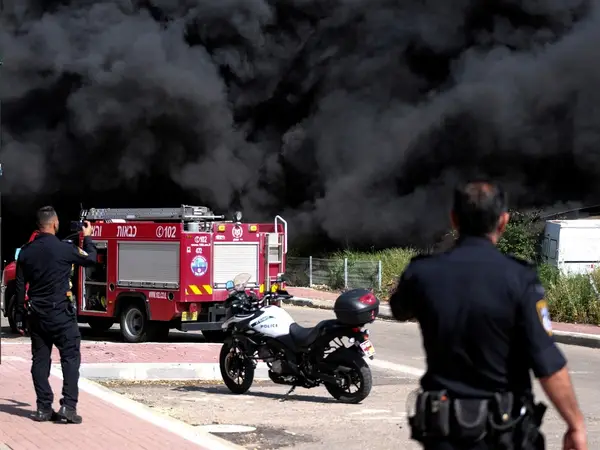A barrage of rockets were fired on northern Israel Thursday in the worst such tensions since the 2006 war, which could lead to expanded conflict and involve Iran.
As of Thursday afternoon, the Israel Defense Forces (IDF) said so far, 34 rockets had been fired into Israel, 25 of which intercepted, with five landing in Israeli territory.
Though Hezbollah has not claimed responsibility for the attacks, the onslaught follows growing tensions with Iran.
An IDF spokesperson told reporters in late afternoon, that Israeli leaders will look into Hezbollah's involvement, although at this point the attacks appear to have been launched by Hamas or Palestinian Islamic Jihad. The spokesperson also said that Israel is "checking Iranian involvement."
He said: "Hezbollah probably knew about the attack as it was in south Lebanon, and Lebanon has a responsibility. We are looking into Iranian involvement."
The statement probably point to Israeli reluctance to blame Hezbollah outright, since that would mean pressure to retaliate against the well-armed, Iran-backed group and a wider war on two fronts for Israel.
In 2023, Israel has launched at least ten attacks on Iranian facilities and infrastructure in Iran, including killing major figures in the Iranian Revolutionary Guard Council.
Israel's Foreign Minister, Eli Cohen, warned the perpetrators "not to test Israel" as the rockets rained down on Thursday, warning of a harsh response.
Iran's Press TV, the voice of the regime, tried to distance its largest proxy from the rocket exchange, attributing it to "Palestinian factions, not Hezbollah", stating it was "retaliatory attacks from Lebanon on Israel following the Israeli regime's forces' aggression on al-Aqsa Mosque".
Tensions in Israel have mounted over the last two days as Hamas members barricaded themselves into the holy Al Aqsa mosque, leading to violent confrontations with Israel Police.
Hamas leader Ismail Haniyeh was in Beirut meeting with counterparts at Hezbollah just hours before the strikes were launched from Hezbollah controlled territory, suggesting a coordinated effort by the militia groups which deem Israel at its weakest point in years.
Israel has been bitterly divided by internal political debate over Prime Minister Netanyahu’s proposed reforms, which have seen three months of mass protest. In echoes of the Yom Kippur War of 1973, the barrage also came at the start of the Jewish holiday of Passover, when most of the country is at home with families.
Netanyahu has called a meeting of his top security advisors for an emergency session to take place Thursday evening, as the situation escalates across the border with Gaza, under Hamas control, Lebanon and at the Al Aqsa mosque.
The UN’s peacekeeping forces in southern Lebanon, UNIFIL, had been told to take cover in shelters as the two sides traded blows while residents in northern Israel are currently in shelters.
Story developing
